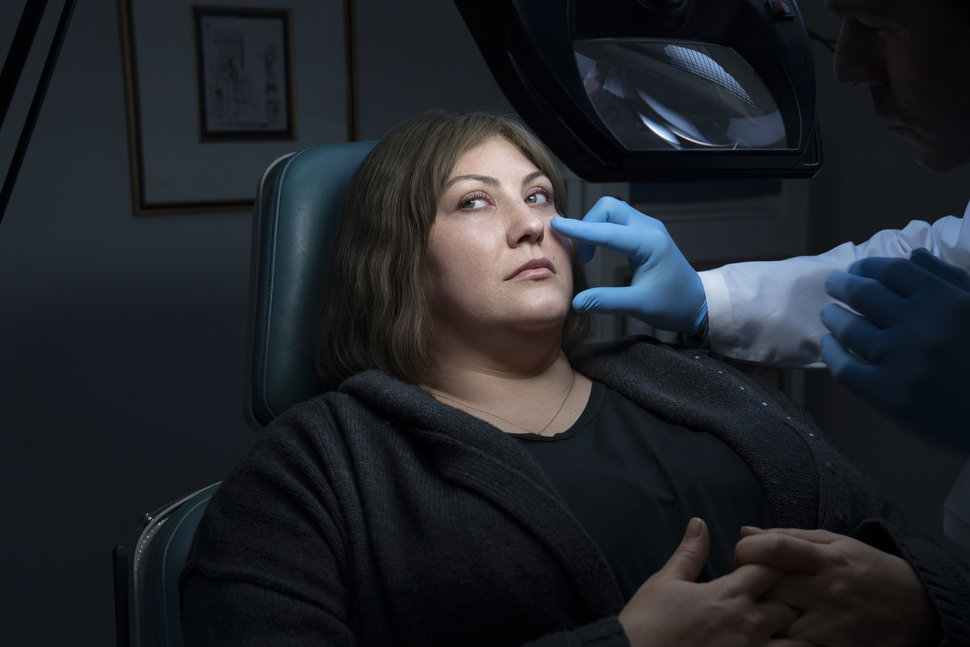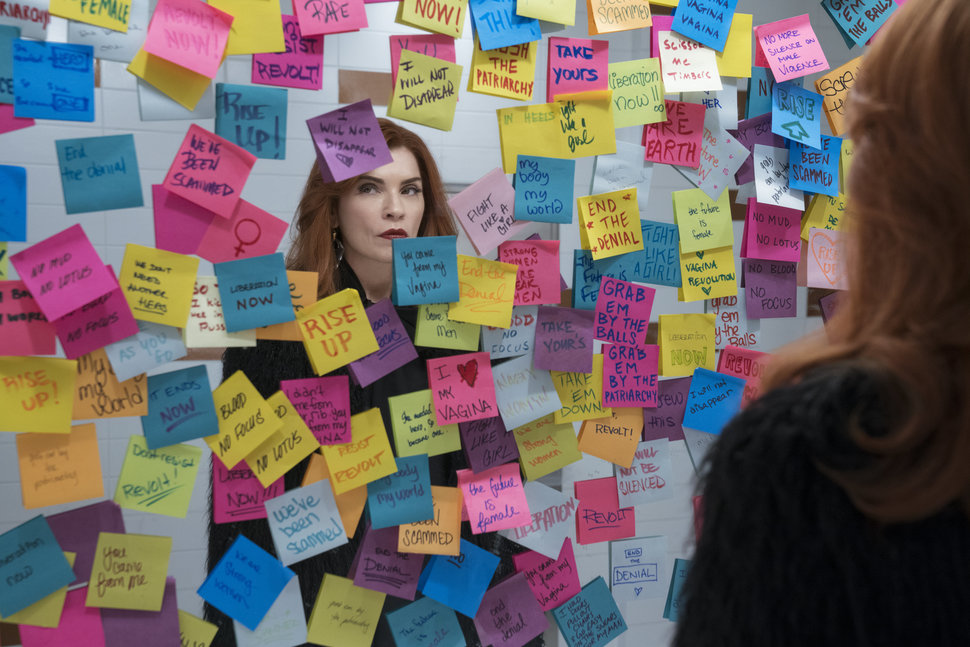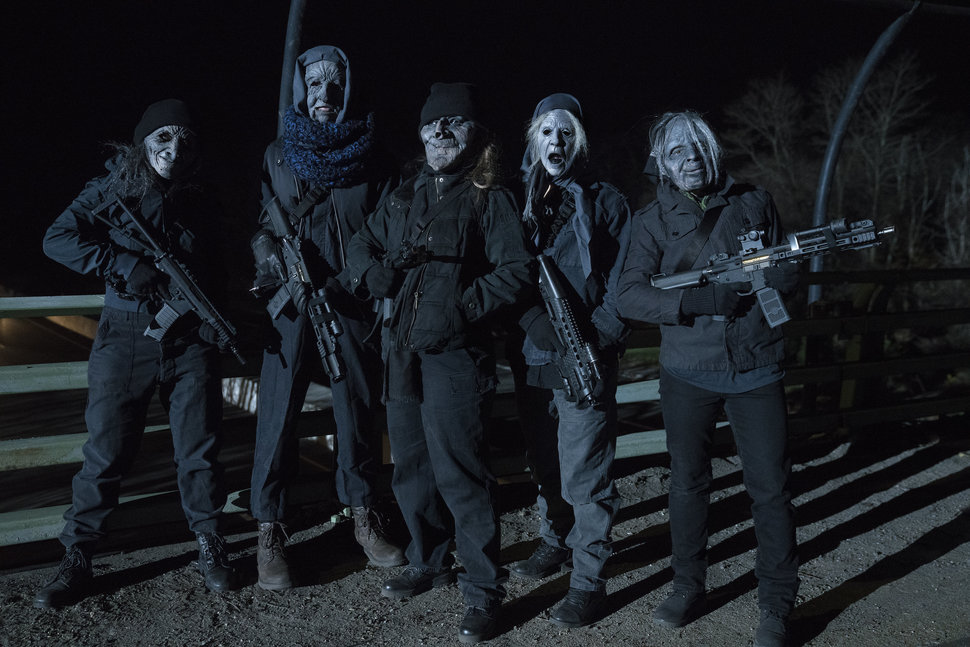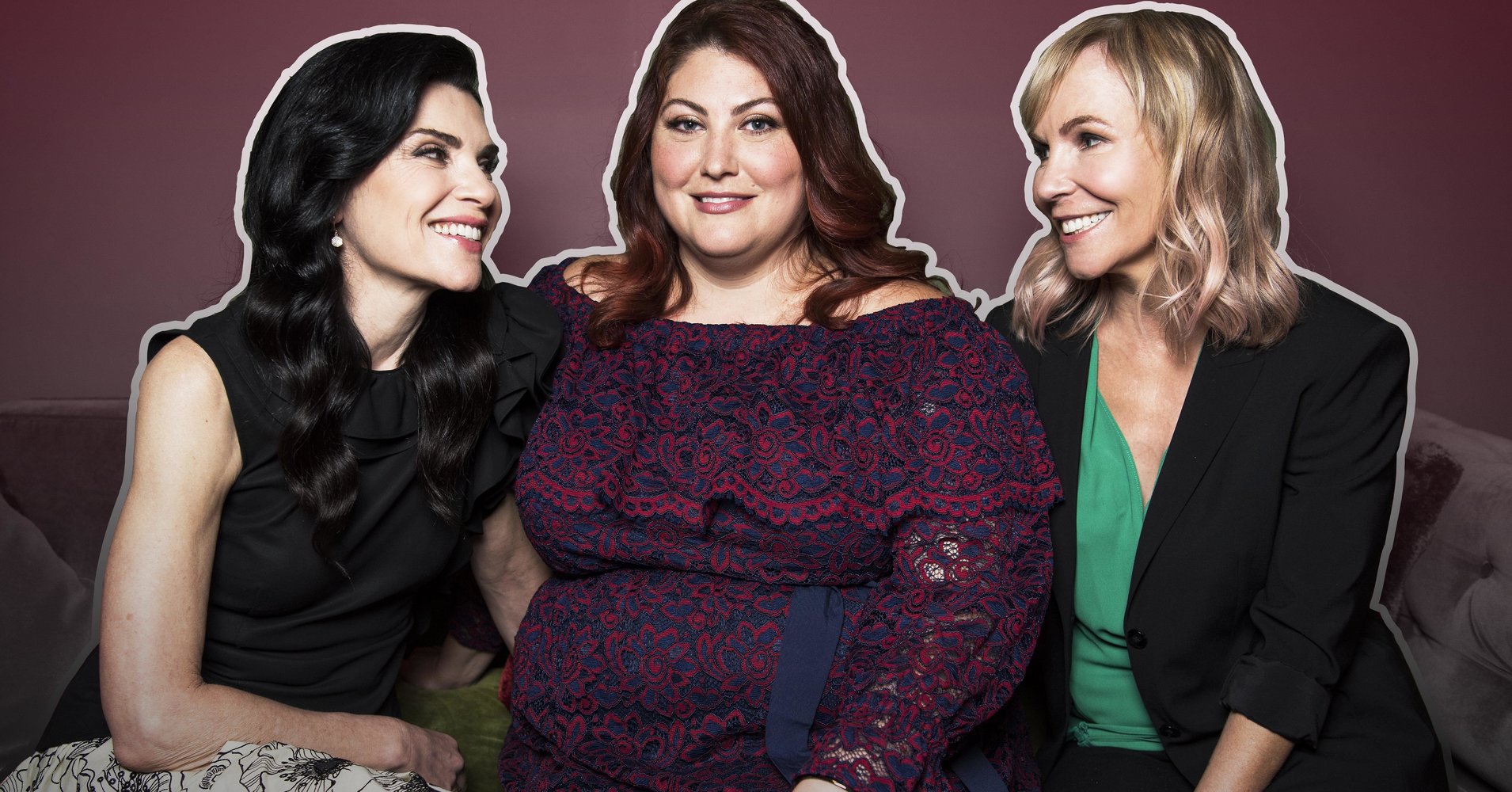[ad_1]
I’m sitting in a hotel room in downtown Manhattan, and Marti Noxon is touching my face.
The showrunner of AMC’s “Dietland” is miming a lifting motion along my jawline, telling me about a recent visit to her dermatologist. We both laugh wryly as we trade stories about skin care routines and our respective doctors’ suggestions for aesthetic improvements, our chuckles betraying a depressing truth about being women: We are nearly always found to be wanting; our bodies and faces always offered up for consumption and commentary. It’s frankly exhausting, and after being human women for decades (me three, her five), we know how to laugh about it ― but we’re still pissed off.
Noxon is the patron saint of female fuming ― at least, on TV she is. Women are angry, both on screen and off, but television is where Noxon can externalize the rage that boils inside many of us.
Her latest manifestation of that anger is “Dietland,” based on Sarai Walker’s 2015 novel of the same name. The AMC show centers around Plum Kettle (played by the effortlessly captivating Joy Nash), a 300-pound woman in Brooklyn who ghostwrites responses to letters to the editor of teen fashion magazine Daisy Chain. (Julianna Margulies is pitch-perfect as fashion editor Kitty Montgomery in all her frosty, polished glory.)
When the show begins, Plum’s life is small, restricted and restrained. She dreams of getting gastric bypass surgery, when she will transform from Plum into Alicia, and her life will finally, truly begin.

AMC
Viewers might be primed, thanks to years of rom-com makeover montages and chick lit storylines, to expect that Plum will lose weight by some means and finally be deemed valuable according to society’s unwritten beauty rules, and subsequently find a hot man and her dream job ― that this is how she’ll come to the opposite of anger: happiness, pleasure, content.
But as the series’ first episodes make explicit, this is not that kind of story. Plum’s transformation will not be one of rapid weight loss followed by all of her dreams falling into neat, rageless order. Her transformation will be a story of internal empowerment, helped along by disavowing weight loss clinic heiress and feminist advocate Verena Baptist (Robin Weigert), covert activist and keeper of the Daisy Chain-affiliated beauty closet Julia (Tamara Tunie), and Julia’s mysterious intern Leeta (Erin Darke). Some external changes will likely follow: Plum will wear colors other than black. She’ll buy clothing that shows off her body rather than hides it. She’ll “decorate” herself as it pleases her, not society. And she’ll do all of this while continuing to be fat. And angry.
Noxon, who has been open about her struggles with body image and disordered eating, sees pieces of herself in Plum. (Nash, on the other hand, came to body acceptance early. Her first brushes with semi-viral fame came from her fantastic 2007 YouTube video ”A Fat Rant.”)
“I think for some people, it’s counterintuitive that I would relate so strongly to a woman whose issue is being fat,” said Noxon. “But it’s just all the same story, which is we all have this idea that there’s another place or another body or another life condition that’s gonna make us happy or protected or safe. I’m really railing against that.”
There are many things that “Dietland” explicitly rails against: the beauty industrial complex, the media’s sexist failings, the way women are told that our value lies in how “bangable” we’re deemed by men, the complicity of some women in the oppression of other women, the daily harassment women face in public spaces, the indignity of aging in a world that both prizes youthful looks and dismisses the young, and the millennia in which men have been free to violate women’s boundaries and bodies with little to no consequence.
In the world of “Dietland,” this long-suppressed female rage bubbles over in the form of Jennifer, a radical feminist group that has begun kidnapping male abusers ― including a photographer who bears a striking similarity to Terry Richardson ― and dropping their bodies out of the sky. It is suggested that Jennifer has ties to a covert counter-programming operation within the bowels of Austen Media, the corporate overlord of Daisy Chain. The resistance is alive and well in the beauty closet.
This is where the revenge fantasy aspect of the show comes in, a prescient story arc that seemed out there when Walker’s book came out in 2015, but hits stunningly close to home in 2018 in the midst of the Me Too movement.
“Three years ago, this was a fantasy that somebody would be held accountable for their bad behavior, and now it’s actually happening,” Nash remarked. “You could only dream about this crazy world where men were afraid of getting in trouble for their bad behavior.”
However, Noxon, ever the realist, scoffs at the idea that our current moment is even a true reckoning. She sees Me Too as a “beginning” and views “Dietland” as one potential vehicle for pushing the current conversation about sexual harassment and assault forward; a way to prevent us from simply drifting “back to something more comfortable.”
‘Dietland’ is most interested in exploring female pain and the rage that often percolates beneath the surface. At its best, the show rips the Band-Aid off of both, exposing the wound and exploring its innards.
At 53, Noxon has made a career out of making feminist TV mainstream, from “Buffy the Vampire Slayer” to “UnREAL.” She developed and currently executive produces not just “Dietland,” but Bravo’s “Girlfriend’s Guide to Divorce” as well as the upcoming HBO miniseries “Sharp Objects,” based on Gillian Flynn’s novel of the same name. It feels like Noxon is everywhere ― The Atlantic, The New York Times, The Daily Beast, and of course, behind the camera on some of TV’s most beloved and innovative projects.
And yet even she isn’t immune to the bullshit messaging all women face. “I just feel like I’m bombarded with these messages constantly that … now that I’m not fertile anymore, I’m invisible,” she said.
The critical response to “Dietland” has been mixed, and with good reason. The show is a messy, heavy, beautiful, surreal, funny, confusing, all-over-the-place and refreshingly honest piece of pop culture ― and the reviews reflect that. Some have criticized the show for feeling dated in its conception of the body positive movement and its ideas about sex work and women’s media. Jezebel writer Kelly Faircloth wrote that “Dietland” “felt like the product of an earlier cultural moment when fat acceptance ideas were first really beginning to bubble up into mainstream culture.”
Plus, magazines today ― like Teen Vogue and Cosmopolitan, both of which seem like obvious models for Daisy Chain ― are at the forefront of feminist reporting and inclusivity. Does it really make sense in 2018 to position a women’s magazine as the nexus of problematic media behavior?
When I asked Noxon about this, she was blunt about her skepticism. “[The media is] just feeding the beast,” she said, referring to the boon of feminist messaging we’ve seen in women’s media. “And I’m sorry to sound so cynical, but I’ve been alive long enough to see these things come and go.”
This point of view plays out explicitly in “Dietland’s” fourth episode. Kitty realizes that her readers are less scared of Jennifer than, as Plum puts it, “exhilarated” by the group, “empowered, or something like that.” Sensing a business opportunity, Kitty pushes for Jennifer’s radical manifesto to be printed on the cover of every Austen Media women’s title. It’s the right thing to do, and it will likely have an impact, but Kitty is motivated by monetary gain and the promise of relevance rather than some altruistic desire to help the young women that read her magazines. In the next episode, when her gamble comes with a steep personal cost ― after all, there’s always a danger in aligning with the radical, especially when that radicalism comes with a side of outright violence ― Kitty is back to directing her anger at Plum instead of the male-dominated industry that consistently belittled and underestimated her.
Noxon sees media, both news and entertainment, first and foremost as a capitalist endeavor ― though one that you can learn to work within to create something good. “I don’t think anybody’s given [the show] to me and to the ‘Dietland’ team only for the good of the people,” said Noxon. “It’s commercial. It’s commercial and I’ve learned through years of doing this business that it’s a business. So I just want to teach my daughter and my son how to read this stuff and take it for what it is. Not … as your best friend trying to do something good for you.”
“Dietland” cues its female viewers to look at the world around them with a critical eye, often explicitly. At times, that means the show beats viewers over the head with its messaging, spelling out why a system is sexist or oppressive rather than simply implying those connections.
“Austen Media is part of the dissatisfaction industrial complex, a hugely profitable machine,” Julia tells Plum during the premiere episode. “They get us to pay them to tell us how broken we are. Then, we pay for the products to fix it. But we’re never fixed, because there’s always some new way that we don’t please the eye of our Big Brother beholder.” When Plum responds that it’s only natural for people to like pretty things, Julia hits back: “You’re not a thing. You are a woman.”
In our conversation, Noxon seemed to anticipate that “Dietland” might face criticism for that straightforwardness. “So often the rules of good writing are ‘show, don’t tell,’” she said. “But there’s some tell in this because literally, it’s a show about a woman who goes into deep therapy … So there’s scenes where people talk about exactly what is happening, which I think is powerful. People are afraid of it. But if you do it with some panache it doesn’t feel like you’re eating vegetables.”

AMC
I’m still unsure of whether I’m bothered or impressed by “Dietland’s” straightforward approach to radical feminism 101. I’ve spent years studying and writing about the concepts that the AMC show grazes, but many of its viewers probably haven’t. It’s a bold move to put feminist ideology front and center, rather than try to sneak it in under the radar.
But more interesting than where “Dietland” begins is where it might go. Not only does the show imagine a world in which a reckoning has begun for abusers and predators; it imagines the impact that this public accounting could have on ordinary women. The changes begin small: A group of women band together to stand up to a harasser in a bodega. A male detective walks alongside Central Park and every woman that passes him stares him down, their resting bitch faces weaponized as if to say “don’t you dare fuck with me or you’ll end up dropped out of a plane.” A passing news report features a middle-aged white man bemoaning the fear he feels walking down his own street, while a young woman talks about her newfound passion for midnight runs. “Never done that before in my life,” she tells the newscaster gleefully. “It’s great.”
As Rebecca Traister wrote in New York magazine, “One reason that the fury of women is regularly dismissed as theatrical and marginal and unserious is precisely because, on some level, the powerful must sense that it is the opposite of all of those things. That, in fact, it presents a very real threat… The reason the anger of a majority gets suppressed is because it has the power to imperil the rule of the minority.”
Because the truth is, female anger can tip the scales and create change if it’s weaponized properly. This is the point that Verena tries to drill into Plum’s brain at the beginning of the show’s most recent episode, explaining that “anger is not a finite thing. It can’t be expunged with one good airing. But it can be directed. You can give it a voice that makes it bearable.”

AMC
What’s clear from “Dietland’s” first six episodes is that the show is most interested in exploring female pain and the rage that often percolates beneath the surface. At its best, “Dietland” rips the Band-Aid off of both, exposing the wound and exploring its innards.
Perhaps there’s a utility in the existence of a prestige cable show in which women’s pain and anger are both shown and told. Maybe, after millennia of repressed anger, we deserve to have it made explicit ― even if that exposition can feel heavy-handed. Maybe seeing our rage reflected back at us and watching women exact the revenge we never would or could or should will just feel good.
“There’s power in the idea that we see you,” said Margulies when I interviewed her alongside Noxon and Nash, pointing to her eyes and then to the imaginary predatory men out in the world. “We’re on. We get it. I felt that way when I watched the first body get thrown from that truck. It felt sort of great … Maybe now you’ll think before you act.”
We, the women of the world, see you, abusive men. And “Dietland,” with its flaws, sees us.
[ad_2]
Source link

